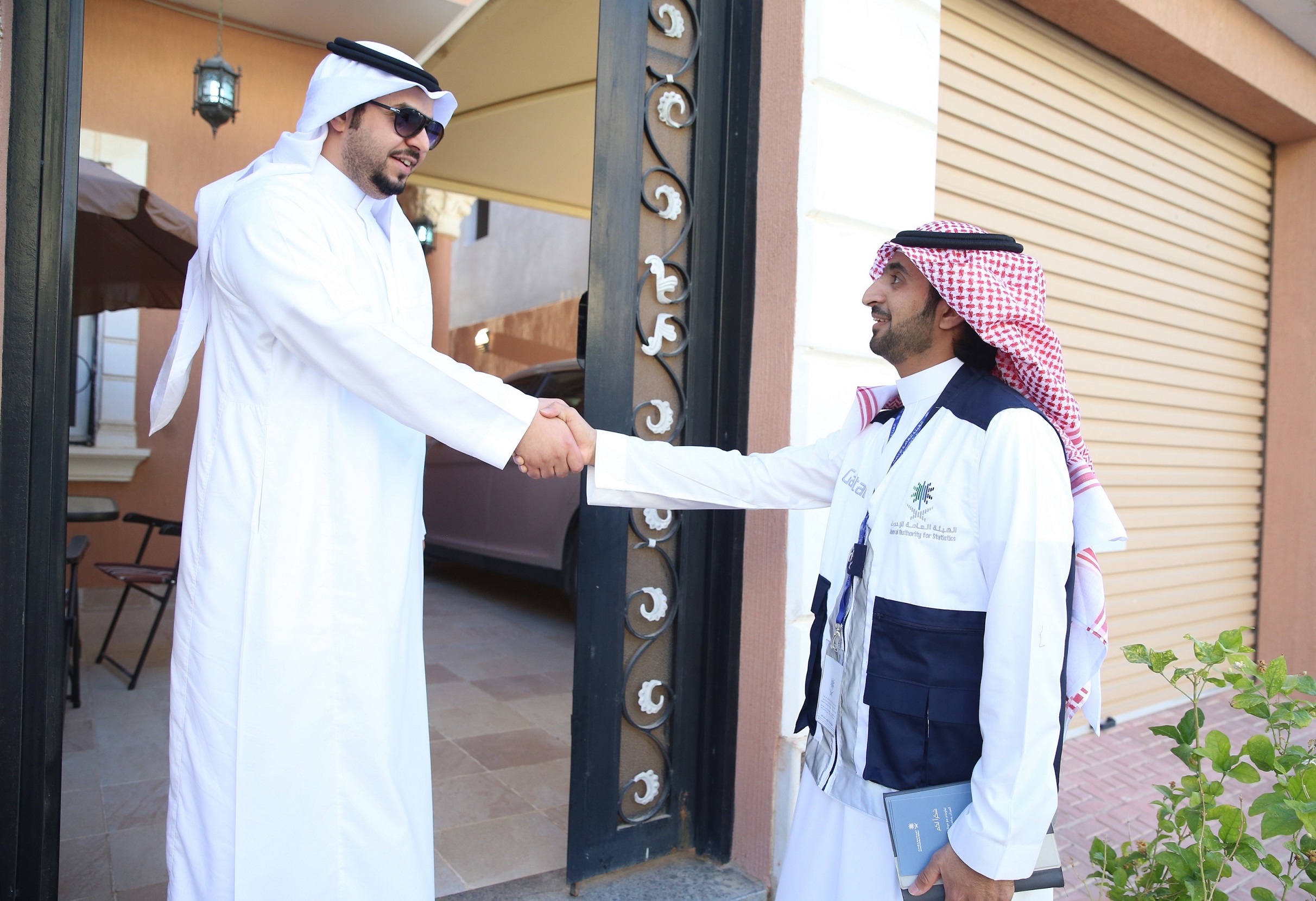
مجلس الوزراء يوافق على التعاون الإحصائي مع هولندا وكوريا
Administrative-based Census and Centralized Data System Included
Cabinet Okays Statistical Cooperation with Netherlands and Korea
As part of its continuous support for statistical sector in Saudi Arabia, the Cabinet has approved in its sessions held on Ramadan 3rd and 17th respectively, the mandate to the Minister of Economy and Planning or his nominee for holding discussions with the Dutch and Korean sides on statistical development, and to sign memorandums of understanding (MoU) with them in this regard.
His Excellency President of the General Authority for Statistics (GAStat) Dr. Fahad Sulaiman Altekhaifi hailed the decision stressing:
“The statistics sector in Saudi Arabia receives ongoing support from our leaders at all levels; establishing the importance of statistics in development. These agreements aim to develop our statistical endeavors based on the world’s best practices in the field. Also, our discussions with the Dutch side will address developing modern mechanisms to implement register-based census in compliance with the internationally recognized standards, including a defined statistical approach to run censuses, document data, and to store them in statistical archives. Also, this includes developing the necessary technical tools to create a comprehensive system from census databases, and leverage them in statistical surveys and studies, those implemented by GAStat, public or private agencies. The bilateral cooperation between KSA and Netherlands enhances sharing statistical awareness programs to ensure community participation and to share success stories, to boost the exchange of expertise between both countries, and to take part in statistics-related training courses, conferences, forums, seminars and workshops."
As far as cooperation with Korea is concerned, GAStat President noted: “It features the development of technical mechanisms to collect and publish statistics in accordance with the internationally recognized standards, to identify basics needed to create a comprehensive system using various statistical databases and to share expertise as to the requirements to build a centralized data center, which will automatically be connected to all public agencies. Also, this is meant to secure the tools needed to activate these centers, and to develop public policies and mechanisms to provide statistics-based technical and advisory services to both public and private entities.
It should be noted that GAStat has undertaken a series of preparatory steps with several local and international organizations towards finalizing the preparations for the (1440H – 2020) census, which will be the first register-based census using administrative records (civil registration number, national ID number, resident ID number), as well as the national home address. Unlike earlier censuses, this census features a comprehensive electronic connectivity with a number of stakeholders, including the National Information Center, Ministry of Education, Ministry of Housing, the Saudi Post, as well as various sectors in concern with the citizen, resident and housing data.

الهيئة العامة للإحصاء تناقش مسودة نظام الإحصاءات العامة
In Collaboration with 19 Government Entities to Develop the Statistical Sector
GaStat Discusses the General Statistics system draft
Within the framework of activating the statistical sector in the Kingdom of Saudi Arabia, the General Authority for Statistics (GaStat) held a workshop on Wednesday, 28 Sha’ban 1438H corresponding to 24 May 2017 with 19 government entities and specialized consultation bodies. The workshop was held to discuss the draft of the general statistics system in preparation for its submission to GaStat’s board of directors then for the concerned entities for approval.
H.E. Dr. Fahad Altekhaifi, GaStat President, expressed his gratitude to the workshop participants and asserted that developing the statistical sector is a joint responsibility between relevant entities. He also added that the aim of this workshop is to ensure that the proposed system draft meets all requirements which maximizes its benefit. Furthermore, he explained that the proposed system draft is comprehensive and keeps up with the latest developments in statistical systems in order to activate statistical work and deepen its impact on planning and enhancing statistical awareness. It also regulates the relationship between GaStat, as a supervisor and organizer of the statistical sector in Saudi Arabia, and all constituents of the statistical sector which includes beside GaStat; statistical administrative units in all government entities, private sector and academic sector.
GaStat’s President also confirmed that the current system provides a solid structure for statistical work with the amendments that have been made over the past years. The regulation which was issued by the Council of Ministers Decision No. 11 issued in Muharram 13th, 1437H enhanced and completed the process of developing statistical work. The regulation included a number of subjects that covered a group of regulatory provisions and the most important of these subjects: emphasizing that the Authority has a public juridical personality, and a financial and administrative independence, it is the entity in charge of statistical affairs, the only official reference to implement statistical work, and it’s the only technical supervisor and regulator of statistical work, it is managed by a board of directors which by the regulation has the powers and authority on the statistical sector and its components in the Kingdom of Saudi Arabia. The regulation gave the Authority the task of establishing a permanent coordinating committee. It also gave it the responsibility of establishing a central system for information which is connecting electronically with all concerned entities. In addition to implementing statistical work, the regulation also assigned other tasks to the Authority which include: applying recognised international standards which include statistical work methodology, survey design and implementation, conducting research and studies, analyse data and information, all information and data documentation work, collecting statistical data and information that covers all aspects of life in Saudi Arabia from its different sources and classify it and section it, either from surveys and censuses or from administrative records in public entities and private establishments, analyse this data and extract its indicators, prepare evidences and national statistical classifications according to international standards, using it and developing whenever needed, prepare statistical bulletins and reports of surveys and research and publish it. The regulation also gave the Authority the right to provide statistical services, conduct surveys, prepare statistical research and studies, provide data from its databases to establishments and business sector in a commercial manner and shall benefit from its financial revenues in financing statistical and information services provided. In addition, it is responsible of transmitting knowledge and provide recommendations to public entities to develop all information system and statistical work methodology to achieve a comprehensive, accurate and unified statistical system and to develop public awareness of the importance of statistics, and to monitor and follow up all published data on the Kingdom of Saudi Arabia with the competent regional and international bodies and coordination with the concerned entities. This regulation reflects the leadership's keenness to develop the main infrastructure of all development decisions considering that the statistical products and services given by GaStat is a solid base to support all national development decisions and support policymakers with information that is considered as the compass of development work, which makes this regulation an added value at the development level on one hand and the activation of the national strategy for statistical development on the other.

" الإحصاء" : انخفاض مؤشر أسعار العقارات للربع الأول من 2017
Based on ministry of justice registry data
GaStat launches real estate index indicator
On Monday 27th of Rajab 1438 H corresponding to 24th of April 2017, GaStat launched the Saudi real estate index indicator. This indicator is based on available registry data of the ministry of justice which are about real estate transactions . GaStat described this indicator as an essential tool that supports entities which make economic and statistical decisions associated with real estate price movements and future expectations during different periods of time. The indicator includes three main sectors composed of many real estate classes: residential sector ( piece of land, building, villa, apartment, and house) , commercial sector (piece of land, building, shop, and commercial center), and agricultural sector ( agricultural lands).
Real estate price index indicator showed a decrease in the Saudi real estate prices during the first quarter of 2017. The indicator registered a decrease of (2.3%) compared to the previous quarter (fourth quarter of 2016). Whereas it registered a decrease of (9.9%) during the first quarter of 2017 compared to the same quarter of last year.
The report attributed the decrease in the first quarter of 2017 (compared to the previous quarter) to the decrease in all composing sectors: commercial sector (1.8%), residential sector (2.6%), and agricultural sector (0.3%).
On the other hand, the decrease in the first quarter of 2017 (compared to the same quarter of 2016) is attributed to the decrease in all composing sectors: commercial sector (11.7%), residential sector (9.5%), and agricultural sector (1.3%).
GaStat indicated in a workshop ,held in " Restatex " exhibition in Riyadh city, that : as an official reference of statistics and an organizer of the statistical sector in Saudi Arabia, one of Gastat tasks is following up the price movement of real estate composing units and recording the values of their transactions all over Saudi Arabia. In addition to monitoring their changes from time to time through the new statistical product " real estate price index" which relies on the data provided by ministry of justice. This represents the integration and cooperation between the different government entities which aim at moving sustainable development forward.
GaStat also stated that the new statistical product aims at founding distinct real estate statistical indicators that measure the Saudi real estate market performance and fill the gap of data in this sector. It is considered an essential tool that supports entities which make economic decisions in this field. This product's data benefit those who are interested in the economic and statistical analysis of real estate prices and the future expectations during different periods of time. GaStat has issued a complete bulletin about this index and its details.

الهيئة العامة للإحصاء تطلق مسح أسري سنوي حتى العام 2020
In a Step Towards qualitative statistical work to measure the economic and social impacts on the household
Gastat launches an annual household survey until 2020
The General Authority for Statistics (GaStat) started last week to visit 24,000 households in all regions of the Kingdom to conduct a survey aimed at households to build economic and social indicators. GaStat called upon all citizens and residents to cooperate with statisticians working in the field in the different 13 regions of the Kingdom of Saudi Arabia, including their cities and governorates. The visits of more than 355 statisticians to households will continue until 8 Sha'ban 1438H corresponding to 4 May 2017.
HE Dr. Fahad Altekhaifi, President of GaStat, explained that this survey is an extension of the tools of supporting decision-makers in developing the study of the economic and social status of households periodically to support the national transformation program by providing economic indicators and readings for households on a yearly basis. In addition, it will track and evaluate the changes in the social and economic indicators of households and their consumption behavior until 2020. His Excellency also explained that the Household Economy Survey is one of the new products that have been designed in cooperation with some government entities in line with international practices in such surveys to meet the needs of general economic changes.
Therefore, the survey covers eight main aspects: household list data, education data, labor data, data on housing characteristics, income and expenditure data, living conditions data, household economic activity data, and future household outlook data. This survey is a complementary to other surveys implemented by Gastat. He also added that the results of the survey will be published in next August.
On the other hand, GaStat met with a number of Household Economy Survey beneficiary government entities:" Ministry of Health, Ministry of Labor, Ministry of Education, Ministry of Trade and Investment, Ministry of Finance, Ministry of Labor and Social Development" when launching field work, in order to introduce the survey and its expected results, describing it as one of the most important national surveys.
GaStat stressed that all data are treated as an information base for decision-makers in all relevant government agencies, which benefit citizens and residents. Gastat also notes that all statistical researchers hold official badges and are officially authorized to collect data to be stored and kept confidentially in accordance with general statistics system issued by the Council of Ministers. GaStat also made available through its official website www.stats.gov.sa the opportunity to access the field research forms on which the data will be collected. All households and establishments can contact the toll free number 8001240440 for any inquiries about this work or any other inquiries.
It should be noted that the General Authority for Statistics follows the international standards approved in the selection of the sample for all its statistical work as part of the statistical society, which is selected according to the of statistical sampling methods and is required to be representative of the society being studied and include the characteristics of the community until the results are published as official statistics and published through its website.
